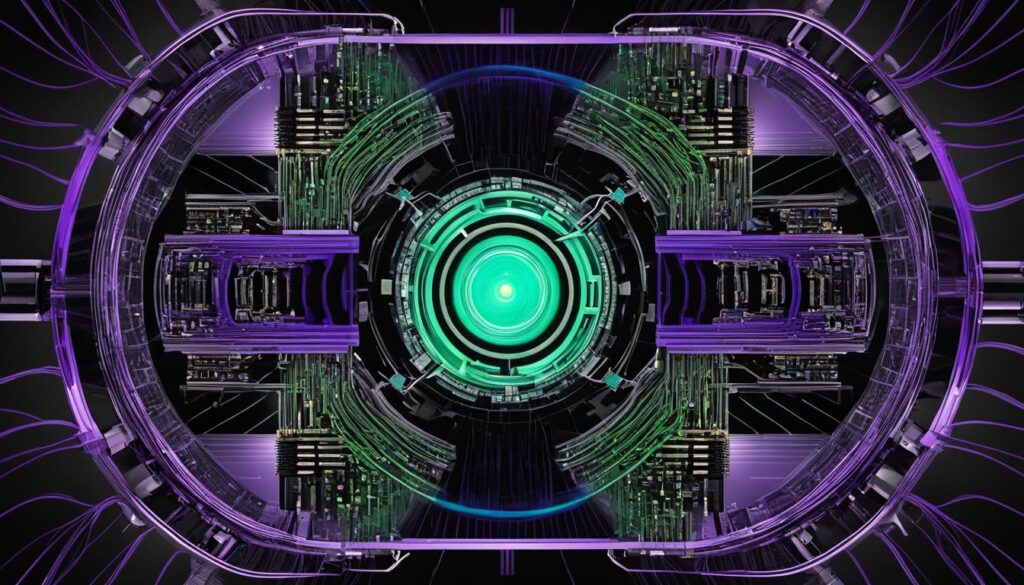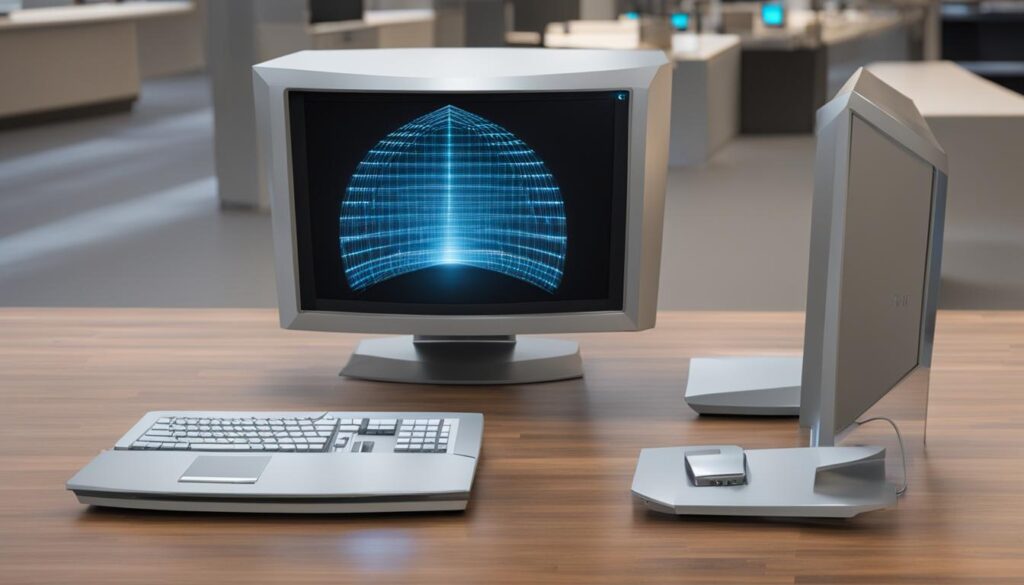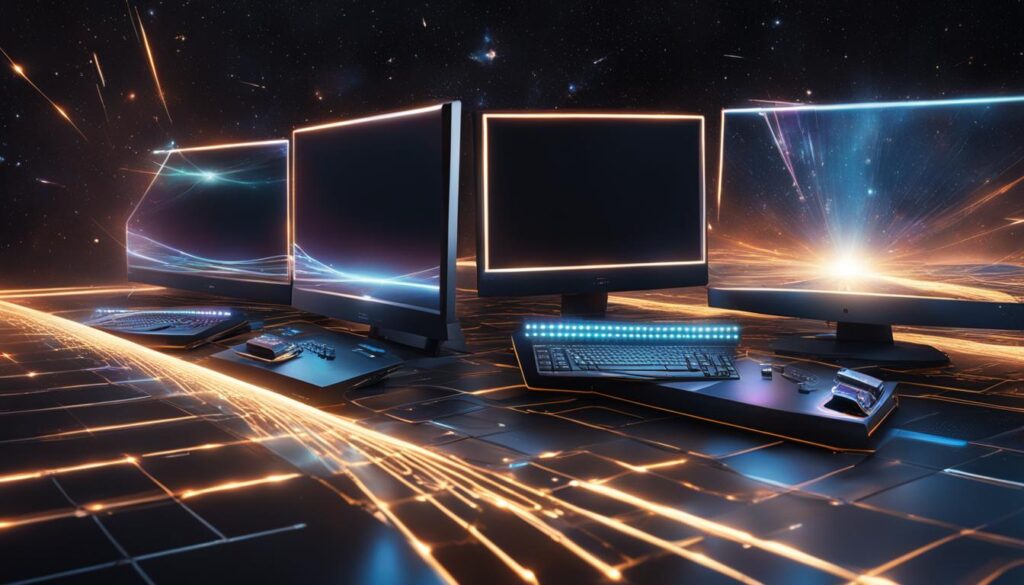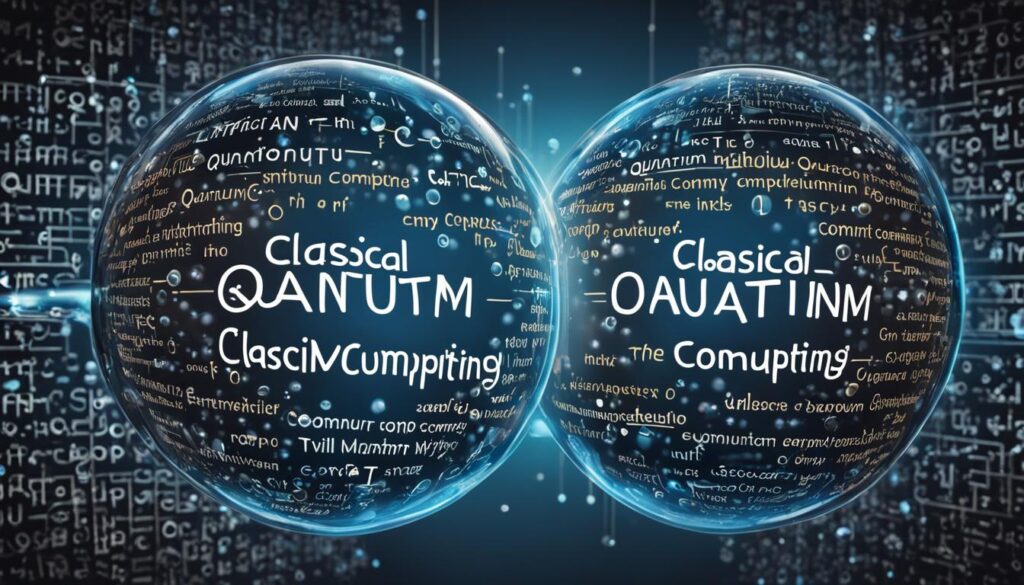In the realm of computational technology, a revolutionary face-off is underway between quantum computing and classical computing. This comparison of quantum computing and classical computing is more than just a technical skirmish—it’s a pivotal moment that could redefine our problem-solving methods and accelerate computation into a new era.
Quantum computers, often likened to computational superheroes, have the potential to perform certain tasks at a speed that leaves traditional machines in the dust. While their classical counterparts have formed the backbone of our digital age, the advent of quantum technology promises an exciting tidal wave of change.
While quantum computing may sound like an intricate dance of advanced physics, it’s essential to peel back the layers and understand both these computing giants’ distinctive characteristics.
Classical computing, the familiar sidekick, has powered countless applications, from creating documents to exploring cyberspace. In contrast, the quantum approach utilizes its qubits to perform complex calculations at an unprecedented pace—something that would seem like science fiction if not for the scientific ingenuity propelling it forward. Let’s delve into the nitty-gritty of these two powerhouses and discover how they’re charting the future of computing.
Key Takeaways
- The face-off between quantum computing and classical computing signals a significant shift in computational capabilities.
- Quantum computers have unique advantages, thanks to their ability to handle complex tasks rapidly.
- Classical computers, though outpaced in specific scenarios, remain integral to everyday computing needs.
- Understanding the core differences in processing and speed is essential to appreciate the potential impact of quantum technology.
- The future holds a vast array of possibilities for quantum computing’s role in advancing cybersecurity and medical science.
The Basics of Quantum Computing vs Classical Computing
The evolution of computation stands at a crossroads with the emergent dichotomy of quantum computing and its progenitor, classical computing. In this section, we explore the fundamental principles that differentiate quantum computing from its classical counterpart, particularly focusing on their processing speeds and computational approaches.
What is Classical Computing?
Classical computing is the technology that has become second nature to us, involving devices that operate using bits as binary switches. These bits can exist in one of two possible states, represented as either 0 (off) or 1 (on), forming the foundation upon which our digital world currently operates. Whether it’s writing an email, playing a video game, or browsing the internet, classical computing enables these day-to-day processes with a consistency that has largely set the tempo for previous technological eras.

Quantum Computing Explained Simply
On the other hand, quantum computing is the avant-garde of computational sciences, which exploits the peculiar properties of quantum mechanics through the use of qubits. Unlike bits, qubits can occupy a state of 0, 1, or any quantum superposition of these states, effectively allowing them to be off, on, or both simultaneously. This capability for handling multiple states concurrently empowers quantum computers to tackle certain complex calculations with astonishing velocity—a paradigm shift that could redefine classical computing speed vs quantum computing speed.
| Aspect | Classical Computing | Quantum Computing |
|---|---|---|
| Data Representation | Bits (0 or 1) | Qubits (0, 1, or both) |
| Speed & Capability | Sequential processing; suitable for everyday tasks | Simultaneous processing; excels in complex problem-solving |
| Usage | Widely utilized in consumer tech, business, and internet services | Specialized applications in scientific research, cryptography, and modeling |
| Main Advantage | Reliability and universality | Higher computational throughput for specific tasks |
Understanding the difference between quantum computing and classical computing is pivotal when envisioning the future landscape of technology. While classical computing has established a pervasive presence in our lives, quantum computing beckons us to an era where the boundaries of speed and complexity in computation could be dramatically expanded.
Understanding How a Quantum Computer Works
The intricacies of quantum computing signal a paradigm shift from traditional computing, which could dramatically alter the comparison of quantum computing vs classical computing performance. This leap in capability is primarily due to two quintessential features of quantum machines: qubits and their interactions through superposition and entanglement.

The Concept of Qubits
At the heart of a quantum computer lies the concept of the qubit, a unit of quantum information that defies classical computation’s binary constraints. Where classical computing relies on bits that represent data as either 0s or 1s, qubits transcend this limitation. Harnessing the laws of quantum physics, qubits can hold far more information than their classical counterparts, appreciably boosting the processing power in quantum versus classical computers. This quantum advantage enables the processing of complex datasets with an efficiency that classical systems cannot match.
Superposition and Entanglement
Two phenomena that set quantum computing apart are superposition and entanglement. Superposition allows qubits to occupy multiple states simultaneously, embodying both 0 and 1 at the same time. It provides the basis for quantum computers to process numerous possibilities concurrently. Entanglement, another quantum marvel, occurs when pairs or groups of qubits become interlinked in such a way that the state of one particle directly correlates with the state of another, regardless of the distance between them. This intricate relationship fundamentally escalates the potential for quantum computers to achieve specific tasks that would be deemed infeasible for classical computers to perform within a realistic timeframe.
| Quantum Phenomenon | Description | Implications in Computing |
|---|---|---|
| Qubits | Quantum bits that can exist in multiple states | Increased data storage and processing capabilities |
| Superposition | Qubits in more than one state at the same time | Ability to perform simultaneous calculations |
| Entanglement | Linked qubits influencing each other regardless of distance | Enhanced communication and problem-solving efficiency |
These groundbreaking quantum properties are what imbue quantum computers with their singular ability to manipulate enormous datasets and solve complex problems at a pace that makes the stark contrast in quantum computing vs classical computing performance undeniable. The profound computational power offered by the quantum approach is not just theoretical—it’s paving the way for new computational horizons.
The Main Differences Between Quantum and Classical Computers
As we delve into the realms of computation, it becomes clear that the comparison of quantum computing and classical computing centers on their core operational distinctions. These variations not only affect the raw classical computing vs quantum computing performance but also the methodology with which they approach problem-solving in the digital universe.

Difference in Processing Data
Classical computers, the stalwarts of our existing digital domain, process data linearly using bits that function in a binary fashion. These bits can either be in an ‘off’ (0) or ‘on’ (1) state, allowing the machine to solve one problem after another in sequence. This serial processing has been the backbone of modern computing, driving virtually all of our current technology.
The Power of Parallel Computing in Quantum Machines
In stark contrast, quantum computers introduce the groundbreaking concept of parallel computing at a fundamental level. Using qubits that can exist simultaneously in multiple states through superposition, a quantum machine can process different potential outcomes at the same time. This capability to explore myriad pathways simultaneously makes for a tremendously powerful computing model, akin to taking a hyper-speed spacecraft across the computational cosmos, compared to the ‘walking’ pace of classical computing.
- Classical Computers: Linear, sequential data processing with bits.
- Quantum Computers: Parallel data processing allows handling multiple solutions concurrently through qubits.
The efficiency and speed at which quantum computers can operate make them well-suited for certain types of complex problems, overshadowing their classical counterparts and redefining what’s possible in computation.
Exploring Quantum Computing vs Classical Computing Speed
The debate of classical computing speed vs quantum computing speed is a hot topic among tech enthusiasts and professionals. While the era of classical computing has seen relentless improvements in speed and efficiency, the fledgling field of quantum computing posits not just an incremental upgrade but a quantum leap forward in the acceleration of computational tasks. Understanding the capabilities of both technologies is paramount to grasping the potential shifts in our digital landscape.
Quantum computing, with its use of qubits, can perform complex calculations that would take classical computers an impractical amount of time to solve. This is possible due to the superposition and entanglement of qubits, allowing an exponential increase in information processing power. To illustrate, quantum computers can analyze and compute vast data sets in the quest for new pharmaceuticals or unravel intricate encryption codes with startling swiftness.

The contrast in computing speed only becomes apparent with certain tasks, which these two vastly different systems approach from unique angles. For example, a complex optimization problem or a large number-crunching exercise shows the remarkable difference in speed when processed by a quantum computer versus a classical one.
| Task Type | Classical Computing | Quantum Computing |
|---|---|---|
| Standard Calculations | Adequate Speed | No Significant Advantage |
| Data Sorting | Fast | Exponentially Faster |
| Encryption Analysis | Impractically Slow | Remarkably Fast |
| Complex Simulations | Limited Capability | Exceptionally Efficient |
Indeed, envision a scenario where decryption that would normally take years with classical computing could be achieved in mere hours with quantum computing. Such a speed disparity highlights not only the superior power of quantum computing in certain domains but also paints a vivid picture of how the future of computing might unfold. As we stand on the cusp of this technological frontier, it becomes increasingly clear that classical and quantum computing will have distinct roles in shaping the world to come.
When to Use Quantum Computing Over Classical Computing
The decision of whether to use quantum computing or classical computing hinges on understanding the optimal use cases for each. The distinction between the two becomes especially significant in tasks that involve complex calculations and massive data processing. Let’s explore situations that merit the employment of quantum computing’s power and the continued relevance of classical computing’s steadfast reliability.

Tasks Best Suited for Quantum Computers
Quantum computing is trailblazing new frontiers with its capacity to handle arduously complex mathematical challenges, making it the preferred technology for certain scientific applications. These include:
- Drug discovery and molecular modeling, where understanding multifaceted chemical compounds is key.
- Cryptographic tasks, which benefit from quantum computers’ ability to quickly factor large numbers.
- Optimization problems in logistics and supply chains that require the analysis of numerous variables and constraints.
- Financial modeling, forecasting, and risk analysis, which necessitate the processing of vast datasets.
- Artificial intelligence and machine learning, especially in developing systems that can analyze huge quantities of data for pattern recognition and decision-making.
These instances represent the optimal use cases for quantum computing, where the technology’s unique capabilities allow it to outperform classical systems significantly.
Why Classical Computers are Still Useful
In the context of our day-to-day computing needs, the reliability of classical computing shines through. Classical systems remain the workhorse for a vast array of tasks that don’t necessitate the extraordinary computing prowess of quantum systems. Such scenarios include:
- Typical office productivity tasks, such as word processing, spreadsheet management, and presentation design.
- Internet browsing and communication via email and social media platforms.
- Media consumption and gaming, where the focus is on graphics processing and user interaction.
- Financial transactions and database management for most businesses.
- Software development and web hosting services.
While quantum computing is breaking ground with its technological marvels, classical computing will remain fundamental in supporting the vast majority of everyday digital activities with its established ecosystems and proven reliability.
Quantum Computing vs Classical Computing Performance
The ongoing development in computational technology has brought us to a point where we can compare the performance metrics in computing for quantum and classical systems. In this realm, speed and efficiency are not just measured in gigahertz or operations per second, but are deeply rooted in the very approach these computers take to process information. The computational efficiency and capabilities of these two methods showcase distinct benefits that could influence the trajectory of tech innovation.

Analyzing the Speed Advantage
When assessing the speed of quantum computing in comparison to classical computing, we’re not merely evaluating the rapidity of calculations but scrutinizing a vast divide in their approach to data processing. Quantum computers exhibit a remarkable agility that, for specific complicated problems, distills years of classical computing work into mere minutes. Such performance speaks volumes of the raw power quantum computing brings to the table, particularly in fields where time is of the essence and traditional processing speeds just don’t cut it.
Comparing Problem-Solving Abilities
Problem-solving in the computing world transcends pure speed—it’s about the deepest levels of computational efficiency and capabilities. Quantum computers, with their unique ability to operate in multiple states, bring an innovative edge to the table. They open doors to answering questions that remain locked to classical computing, elevating the potential to explore scientific conundrums previously deemed unsolvable. The convergence of such powers hints at a future where quantum computing could revolutionize how we unravel the mysteries of science and mathematics.
| Computing Aspect | Classical Computing | Quantum Computing |
|---|---|---|
| Speed for Simple Troubleshooting | Favorable | Comparable, with little to no advantage |
| Speed for Complex Problems | Can be significantly slow | Significantly faster, resolving in minutes to hours what may take years |
| Problem-Solving Range | Broad but limited by binary processing | Extensive, can engage in superposition and entanglement |
| Appropriateness for Everyday Computing | Optimal and practical | Not currently suitable for general computing |
| Future Potential | Continuous improvement in speed and performance | Unprecedented advancement in challenging domains |
Future Implications of Quantum Advancements
The inexorable march of technological progress has seen breakthroughs in quantum computing emerge as the vanguard heralding a new epoch. Advancements in this field are not merely enhancing computation; they promise to reform critical areas like future tech in cybersecurity and healthcare, with profound implications for both these domains.
Impact on Cybersecurity
In cybersecurity, the advent of quantum capabilities redefines the arms race against digital marauders. As quantum computers proliferate, they could forge nearly impregnable encryption, nullifying the prowess of modern-day hackers. Simultaneously, they pose the existential threat of breaking current encryption models, thus catapulting cybersecurity into an age of quantum readiness—where only the quantum premium can ensure one’s digital fortress remains impregnable.

Quantum Computing in Medicine and Science
The ripple effects of quantum computing in medicine and science could be tantamount to a renaissance. Quantum systems proffer unparalleled computational acumen that could expedite the discovery of new treatments, unravel the complexities of genetic diseases, and foster preventative medicine through predictive models. Notably, in scientific research, quantum computing might illuminate cryptic quantum processes themselves—thereby opening doorways to hitherto unreachable understandings of our universe.
Across these frontiers, quantum computing stands as a bastion of hope, with its tantalizing potential charting the course for a future teeming with technological marvels once consigned to the annals of science fiction.
Myths and Misconceptions About Quantum Computing
When exploring the dynamic world of advanced computing, it’s crucial to separate fact from fiction—especially when discussing the fascinating realm of quantum computing. An essential part of understanding this revolutionary technology is dispelling quantum computing myths and uncovering the truth about quantum capabilities.

Some believe that quantum computers are the be-all and end-all solution to every computational problem. While their abilities are indeed groundbreaking, they are not universal replacements for classical computers. Quantum computers excel in tasks involving massive data sets and complex computations, but for many day-to-day tasks, classical computers are still more than sufficient.
Quantum computing is to be regarded as a supplement to classical computers, not a substitute.
Another common misconception is that quantum computers are on the brink of becoming a household staple. The idea of having a personal quantum computer is exciting; however, despite significant strides in the field, the full commercial deployment of quantum computers is still in development. Researchers are diligently working to overcome formidable technical challenges that stand between today’s prototypes and the quantum devices of the future.
| Myth | Reality |
|---|---|
| Quantum computers can solve all types of problems better than classical computers. | Quantum computers are specialized for complex problems not suited to classical computation. |
| Quantum computers will soon replace all classical computers. | Classical computers will continue to be used extensively for everyday tasks. |
| Quantum computers will be in every home in the near future. | The widespread home use of quantum computers remains a long-term possibility. |
By confronting these misconceptions, we can foster a realistic understanding of what quantum computing will mean for the future. It is an exciting complement to classical systems, promising to tackle problems once deemed insurmountable, but it is not yet a direct competitor in all fields of computing.
Educational Resources on Quantum Computing vs Classical Computing
If you’re keen to learn about quantum computing and its differences from classical computing, there’s a wealth of educational materials at your disposal. From comprehensive educational guides on classical computing to in-depth analysis on quantum mechanics, resources are available in various formats to cater to every learning style. Let’s explore both user-friendly literature for beginners and dynamic online learning platforms that can turn you into a savvy enthusiast from home.
Books and Articles for Beginners
Diving into the world of quantum and classical computing might seem daunting at first, but several authors have skillfully demystified these topics for the everyday reader. Whether it’s through metaphor-rich narratives or real-world examples, these books and articles break down complex concepts into digestible sections, facilitating a smooth learning journey for beginners eager to grasp the fundamentals of both quantum and classical computing.
- Quantum Computing for Everyone by Chris Bernhardt
- Classical and Quantum Computing: with C++ and Java Simulations by Yorick Hardy and Willi-Hans Steeb
- Articles like “Quantum Computing 101” from the online magazine Wired
- The accessible series on quantum technologies in Nature
With such resources, delving into the world of bits and qubits becomes an educational adventure. Still, other platforms provide interactive experiences for those who prefer a more hands-on approach to learning.
Online Courses and Tutorials
For hands-on learners, there are numerous online courses and tutorials that deliver engaging content about how these fascinating computing paradigms work. Interactive modules allow learners to apply concepts in virtual labs, and forums provide a space for discussion and clarification with peers and experts alike. Here are a few platforms offering comprehensive online courses to get you started:
- Coursera’s “Quantum Computing Fundamentals”
- edX’s collection of courses from top universities on “Quantum Technology”
- Udemy’s “Quantum Computing for the Determined”
- Qiskit’s learning platform offering a range of tutorials right from quantum basics to advanced concepts
These online courses not only teach theoretical aspects but also cover practical applications, demystifying quantum problems and simulations. This integrative approach solidifies your understanding and prepares you for the expanding universe of quantum computing.

By leveraging these educational resources, from page-turning books to immersive digital courses, you can begin to build a solid foundation in understanding how quantum and classical computing are reshaping our technology landscape. Whether you’re a curious enthusiast or an aspiring professional, the journey to mastering these topics starts with the first step of exploration.
Conclusion
Wrapping up this discourse on quantum computing vs classical computing, we’ve traversed a vast landscape where each computing paradigm exhibits its own strengths and charm. Quantum computing emerges as a formidable force, promising to revolutionize the way we tackle computation, while classical computing retains its fundamental role as the cornerstone of our current digital lifestyle. This exploration has shed light on the diverse problem-solving capabilities and the pivotal roles both play in the ongoing narrative of computational technology.
As we peer into the horizon of the future of computational technology, it’s palpable that the confluence of quantum computing with established computational models heralds a profoundly transformative era. The fusion of quantum principles with our digital framework suggests an exhilarating frontier where the bounds of processing power and problem-solving acumen will expand. The trajectory for quantum advancements seems stellar, presaging unforeseen breakthroughs that could redefine the parameters of technology, medicine, cybersecurity, and more.
In essence, summarizing quantum computing vs classical computing is akin to acknowledging a symbiotic partnership between two dynamos of innovation, both integral to our technological evolution. Quantum computing, with its astounding capacities, is on course to elevate computational technology to stratospheric heights, beckoning us to reimagine what is computationally possible. As enthusiasts and professionals alike, we stand at the precipice of an exhilarating chapter of progress—anticipating the wave of opportunities that these awesome machines might unlock as they mature and integrate into the tapestry of our digital existence.
FAQ
What are the basic differences between quantum computing and classical computing?
The key difference lies in how they process data. Classical computers use bits as tiny on-off switches, while quantum computers use qubits that can be in multiple states at once due to quantum superposition. This enables quantum computers to handle complex calculations at a much faster rate than their classical counterparts.
How do qubits work in quantum computing?
Qubits are the foundational units of quantum computing. They function according to quantum mechanics, allowing them to exist in a state of superposition (being both 0 and 1 simultaneously) and entanglement, where two qubits in different locations can be interconnected and instantly affect each other – a property that’s central to a quantum computer’s power.
What makes quantum computing faster than classical computing?
Quantum computing utilizes the phenomena of superposition and entanglement to perform parallel processing, which means it can work on multiple possibilities at once. This parallelism offers a significant speed advantage for certain computations, making quantum computers incredibly fast compared to classical computers for particular tasks.
Are there specific tasks where quantum computing is more beneficial than classical computing?
Yes, quantum computing is particularly advantageous for tasks requiring complex problem-solving and massive computational power, such as simulating molecular structures for drug discovery or optimizing large systems. These tasks use quantum computing’s ability to quickly navigate through a vast number of possible solutions.
Why are classical computers still important, despite the advent of quantum computing?
Classical computers are still crucial because they’re suitable for everyday use, like browsing the internet, creating documents, or gaming. They’re reliable and efficient for tasks that don’t necessitate the unique capabilities of quantum computers.
Can quantum computing impact fields like cybersecurity and healthcare?
Absolutely. In cybersecurity, quantum computing can vastly improve encryption and data security measures. In healthcare, it has the potential to revolutionize drug development and advance our understanding of complex biological systems, potentially leading to breakthroughs in disease treatment and prevention.
Are there any common myths about quantum computing that need clarification?
One widespread myth is that quantum computers will replace classical computers for all tasks, which is not true. Quantum computers excel at specific types of computations but aren’t intended to perform all computing tasks. Additionally, it’s a misconception that consumer quantum computing is just around the corner; this technology still requires significant development before becoming mainstream for personal use.
How can someone learn more about quantum computing and classical computing?
There are several resources available for those interested in learning about these fields. Beginners can find a variety of books and articles that explain complicated concepts in simpler terms. For hands-on learners, online courses and tutorials offer interactive opportunities to understand how quantum and classical computers operate.
